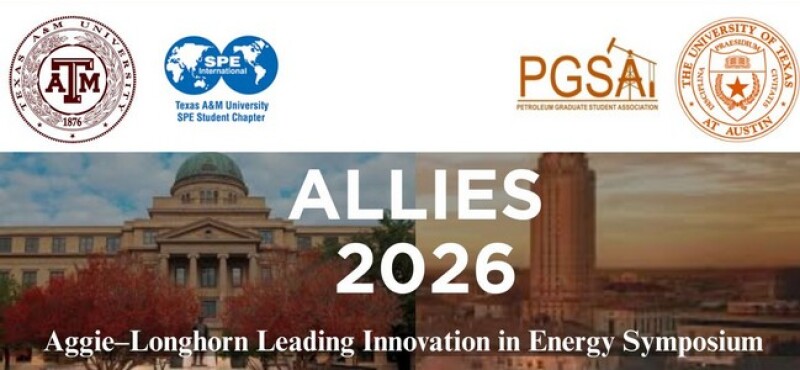Texas A&M University’s SPE Student Chapter (TAMU-SPE) and The University of Texas (UT) at Austin’s Petroleum & Geosystems Engineering Graduate Student Association (PGSA) are excited to announce a landmark event that brings together graduate students, faculty, and industry leaders for a full day dedicated to advancing research, career growth, and energy innovation.
ALLIES 2026, the first-ever collaboration between TAMU-SPE and PGSA, is a symposium designed to bridge the gap between academia and industry. Highlights include:
- 3-Minute Research Pitches showcasing graduate student innovation.
- Poster Sessions for in-depth research discussions.
- Career Fair and Networking connecting students, recruiters, and industry professionals.
- Industry Lightning Talks on frontiers in oil and gas, the low-carbon future, and artificial intelligence/data science applications.
- Expert Panels on the role of SPE in shaping engineers' and recruiters’ perspectives on job market trends.
Though Texas A&M and UT Austin are historic rivals, both universities share a common mission: preparing engineers to lead in an evolving energy landscape. By joining forces, we send a powerful message: the future of energy innovation depends on collaboration, not competition. ALLIES 2026 embodies this vision, bringing together two legacy programs to amplify research, foster stronger industry partnerships, and inspire the next generation of energy leaders.
The event is free, thanks to our sponsors, and is open to students, academia, and industry professionals beyond UT Austin and Texas A&M.
Companies interested in sponsoring the event can choose from four tiers.
- Platinum ($10,000): premier recognition, banner, exhibit, and networking table.
- Gold ($5,000): banner and networking table.
- Silver ($3,000): recognition in promotional materials and our social media platforms.
- Bronze ($1,000): recognition in promotional materials.
- Companies interested in sponsorship can access the sponsorship interest form to learn more.
For sponsorship inquiries, please contact:
- Taha Yehia (Texas A&M SPE): taha.yehia@tamu.edu | +1 979-290-2265
- Nadia Mouedden (UT Austin PGSA): nmouedden@utexas.edu | +1 701-885-2179
Save the Date
- Date: Friday, 9 January 2026, 8:00 AM to 5:00 PM CT
- Location: Oxy Woodlands Office, The Woodlands, Texas
- Cost: Free for all participants.
- Audience: Open to students, academia, and industry professionals beyond UT Austin and Texas A&M.
- Registration: Register here by 31 October 2025.

Nadia Mouedden is a PhD candidate in petroleum engineering at The University of Texas at Austin and a reservoir and production engineer by training. Her expertise spans both traditional oil and gas and emerging energy technologies such as CO2 storage and geothermal.
Her research and industry internships have focused on reservoir and production engineering, well integrity, and hydraulic fracturing. She has contributed to projects on CO2 storage injectivity improvements, enhanced geothermal system reservoir modeling, proppant transport optimization, cement bond quality evaluation, and well-stimulation candidate selection.
Beyond research, she is an active leader in the student community. She served as president of UT Austin’s Petroleum Graduate Student Association (PGSA), previously led the Society of Petrophysicists and Well Log Analysts student chapter, and has been actively engaged with SPE since 2017. During her time as a student chapter officer, both the SPE Boumerdès and University of North Dakota chapters earned the SPE Presidential Award for Outstanding Student Chapter. She has also supported technical events, student outreach, competitions, and contributed as a reviewer for SPE Journal.
She has authored multiple technical papers and presented at major conferences, advancing energy solutions through both experimental and numerical approaches.

Taha Yehia is pursuing his PhD in petroleum engineering at Texas A&M University, where his work brings together reservoir engineering and emerging energy technologies. With a background that spans both conventional oil and gas development and the energy transition, he focuses on advancing CO2 storage, hydrogen storage, and geothermal applications through computational modeling and artificial intelligence.
His research combines machine learning and reinforcement learning to address challenges in subsurface systems. Projects have ranged from optimizing CO2 injection strategies and geothermal reservoir design to improving shale gas reserve estimation, decline curve analysis, and drilling efficiency. A central theme in his work is the use of reduced-order modeling and AI-based optimization to shorten evaluation cycles and deliver practical insights for field operations.
In addition to research, he has held leadership roles including co-chairing the inaugural Aggie–Longhorn Leading Innovation in Energy Symposium (ALLIES 2026), led the Technical Exhibition and Networking Event (TENE 2025) at Texas A&M’s SPE Student Chapter, and has been an active contributor to the SPE Gulf Coast Section Data Science Study Group as well as SPE Young Professionals in Egypt. Through these roles he has organized technical programs, expanded industry–student engagement, and strengthened professional networks.
His work has resulted in more than 20 technical papers and numerous conference presentations, reflecting his commitment to advancing energy engineering through innovation, collaboration, and digital transformation.

